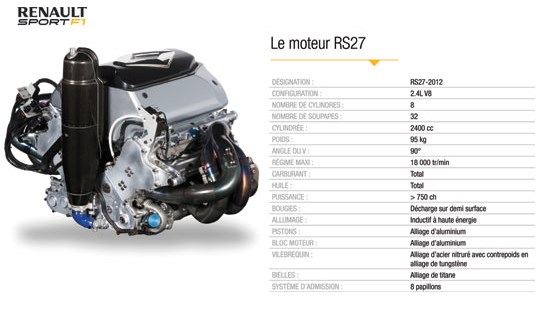POWERED BY RENAULT SPORT


The current engine, known as the RS27 is a V8 750 horsepower turning 18,000 rpm. The blocks are produced identical for the four partners RSF1 teams: the double world champion champions Red Bull Racing, Lotus F1 Team, stable double world champion in 2005 and 2006 when it was still called Renault F1 Team Caterham F1 team, best newcomer team in 2010 and 2011.
These three teams are joined by Williams, to reconstruct the Williams-Renault combination that dominated the discipline in the 90s with five constructors 'titles and four drivers' titles between 1992 and 1997.
Although the engines supplied are identical for the four teams, the service is tailored to each partner team. This ability to adapt to the demands, cultures and different work environment is a key to the success of Renault in its long history in Formula 1. A team of engineers and technicians RSF1 is dedicated to each team in the Grand Prix, with the maintenance of a continuous support in Viry-Chatillon.
Although the engines supplied are identical for the four teams, the service is tailored to each partner team. This ability to adapt to the demands, cultures and different work environment is a key to the success of Renault in its long history in Formula 1. A team of engineers and technicians RSF1 is dedicated to each team in the Grand Prix, with the maintenance of a continuous support in Viry-Chatillon.
The renewed commitment of Renault vis-à-vis the F1 highlights how the image of this discipline is important for the brand. In addition to being a great platform to promote its image around the world, the highest level of motorsport is the ideal laboratory to develop and test new technologies for Renault. This factor will become more and more momentum in the coming years with the introduction of a new engine regulations in 2014. The aim is to reduce emissions and to focus on sustainable technologies.
The current engine, known as the RS27 is a V8 750 horsepower turning 18,000 rpm. The blocks are produced identical for the four partners RSF1 teams: the double world champion champions Red Bull Racing, Lotus F1 Team, stable double world champion in 2005 and 2006 when it was still called Renault F1 Team Caterham F1 team, best newcomer team in 2010 and 2011.
These three teams are joined by Williams, to reconstruct the Williams-Renault combination that dominated the discipline in the 90s with five constructors 'titles and four drivers' titles between 1992 and 1997.
Although the engines supplied are identical for the four teams, the service is tailored to each partner team. This ability to adapt to the demands, cultures and different work environment is a key to the success of Renault in its long history in Formula 1. A team of engineers and technicians RSF1 is dedicated to each team in the Grand Prix, with the maintenance of a continuous support in Viry-Chatillon.
The renewed commitment of Renault vis-à-vis the F1 highlights how the image of this discipline is important for the brand. In addition to being a great platform to promote its image around the world, the highest level of motorsport is the ideal laboratory to develop and test new technologies for Renault. This factor will become more and more momentum in the coming years with the introduction of a new engine regulations in 2014. The aim is to reduce emissions and to focus on sustainable technologies.